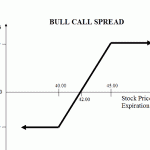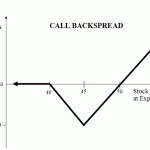A type of options strategy used when a moderate rise in the price of the underlying asset is expected. It is achieved by purchasing call options at a specific strike price while also selling the same number of calls of the same asset and expiration date but at a higher strike. The maximum profit in this strategy is the difference between the strike prices of the long and short … [Read more...]
Call Back Spread- Options Trading
The call backspread is an investment strategy that involves selling a call at one strike price at a lower rate and then purchasing two calls at a higher strike price. This approach provides the call ratio backspread with a built in hedge component that is very likely to result in breaking even for the investor, and possible even realizing a small profit. The call backspread … [Read more...]
What is Options Strike Price and Expiration Date?
Options - Strike Price and Expiration Date Definition: Options trading uses several related phrases that are unique to options markets. Some commonly used, but often misunderstood options phrases are : Strike Price The strike price (or exercise price) of an options contract is the price that the underlying security will be bought or sold at if the option is exercised (i.e. … [Read more...]
What are Time Premium in Futures Options?
Time Premium in Futures Options Definition: Time premium describes the part of an option price that is above the intrinsic value of the option. Typically, the more time remaining on an option, the higher its time premium. The reasoning behind this is that the more time you have on an option, the better chance you have for the underlying futures contract to move in your … [Read more...]
Which is more riskier : Futures or Options
Are Futures Riskier Than Options Let’s face it, derivative trading is risky. Period. Derivatives such as futures and options are leverage instruments and by virtue of being leverage instruments, derivatives inherently carry more risk and exposure than pure and simple stock trading. Leverage instruments are risky because leverage allows you to do more with the same amount of … [Read more...]

